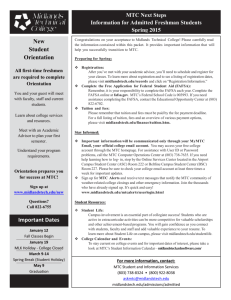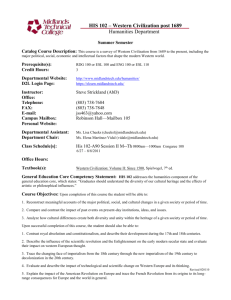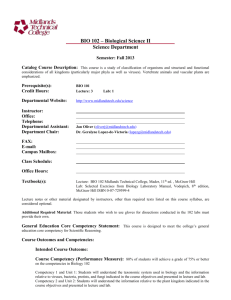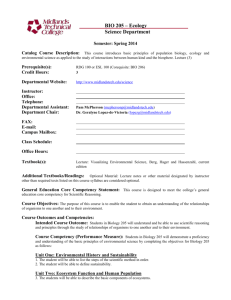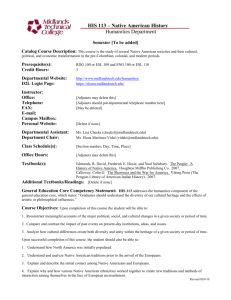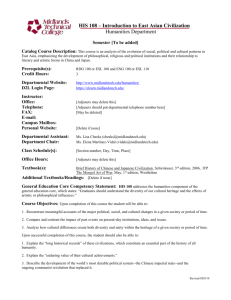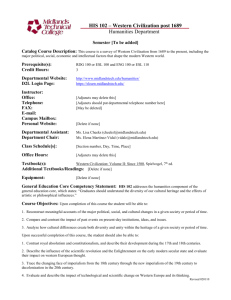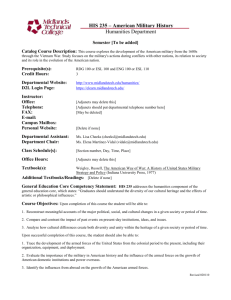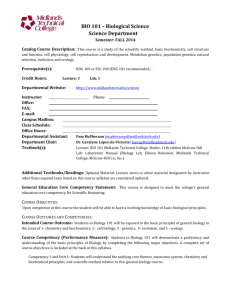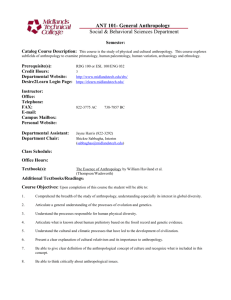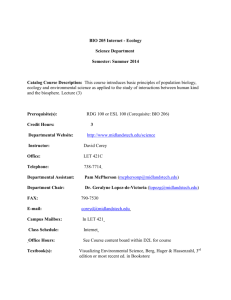BIO 102 - Midlands Technical College
advertisement
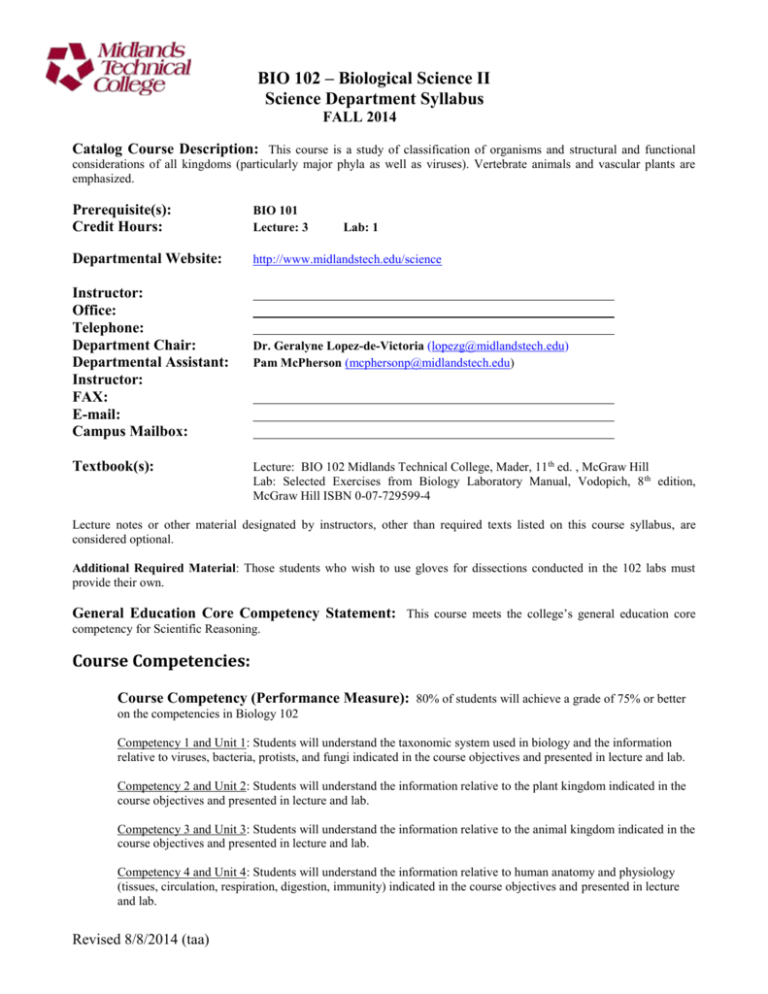
BIO 102 – Biological Science II Science Department Syllabus FALL 2014 Catalog Course Description: This course is a study of classification of organisms and structural and functional considerations of all kingdoms (particularly major phyla as well as viruses). Vertebrate animals and vascular plants are emphasized. Prerequisite(s): Credit Hours: BIO 101 Lecture: 3 Departmental Website: http://www.midlandstech.edu/science Instructor: Office: Telephone: Department Chair: Departmental Assistant: Instructor: FAX: E-mail: Campus Mailbox: Textbook(s): Lab: 1 Dr. Geralyne Lopez-de-Victoria (lopezg@midlandstech.edu) Pam McPherson (mcphersonp@midlandstech.edu) Lecture: BIO 102 Midlands Technical College, Mader, 11th ed. , McGraw Hill Lab: Selected Exercises from Biology Laboratory Manual, Vodopich, 8 th edition, McGraw Hill ISBN 0-07-729599-4 Lecture notes or other material designated by instructors, other than required texts listed on this course syllabus, are considered optional. Additional Required Material: Those students who wish to use gloves for dissections conducted in the 102 labs must provide their own. General Education Core Competency Statement: This course meets the college’s general education core competency for Scientific Reasoning. Course Competencies: Course Competency (Performance Measure): 80% of students will achieve a grade of 75% or better on the competencies in Biology 102 Competency 1 and Unit 1: Students will understand the taxonomic system used in biology and the information relative to viruses, bacteria, protists, and fungi indicated in the course objectives and presented in lecture and lab. Competency 2 and Unit 2: Students will understand the information relative to the plant kingdom indicated in the course objectives and presented in lecture and lab. Competency 3 and Unit 3: Students will understand the information relative to the animal kingdom indicated in the course objectives and presented in lecture and lab. Competency 4 and Unit 4: Students will understand the information relative to human anatomy and physiology (tissues, circulation, respiration, digestion, immunity) indicated in the course objectives and presented in lecture and lab. Revised 8/8/2014 (taa) Competency 5 and Unit 5: Students will understand the information relative to human anatomy and physiology (endocrine system, nervous system, reproduction and human development) indicated in the course objectives and presented in lecture and lab. Measurement Instrument: The results of lecture exams and quizzes, lab quizzes, lab practical exams, and assigned homework and reports measure student performance and determine the final grade. Program and course-assessment activities are deployed and results collected in accordance with the College’s assessment schedule. Refer to the information in this syllabus regarding the assessment activity for the current semester. Course Attendance: Students may miss a class twice the number of times that the class meets each week. For example if a class meets 2 times per week, 4 absences are allowed. A student who exceeds the maximum allowed absences will be dropped from the course. If the student misses more than 10 minutes of class by either arriving late or leaving early, then the student will be counted as absent. Missing fewer than 10 minutes is a tardy. Three tardies count as one absence. Students adding courses after classes begin are responsible for work covered from the first day of class. All classes missed count as absences. Please note the following: You (the student) are responsible for all material and announcements presented, whether or not you are present for the class. Withdrawal: Students may withdraw from a course any time before the last week of classes (see the current semester college calendar, available on the MTC web site, for official dates). Students who wish to withdraw from a course must submit a withdrawal form to records. The date of withdrawal may affect a number of things, including financial aid/ tuition reimbursement, tuition refunds, and course grades. The effective date of withdrawal depends upon the date the withdrawal form is submitted to records. It is the student’s responsibility to be aware of relevant dates, to make an informed decision, and if necessary, to submit withdrawal forms in a timely fashion. For questions regarding the effect of withdrawal on financial aid or tuition reimbursement students should contact Student Financial Services. Deadlines for tuition refunds are posted on the current semester college calendar, and are available on the MTC web site, or by calling the cashier’s office. Students who withdraw before midterm will receive a grade of W. Students who withdraw after midterm and have an overall class average of 60% or greater will receive a grade of W. Students who withdraw after midterm and have an overall class average below 60% will receive a grade of WF, which is calculated as an F. Grades of W or WF are assigned when a student exceeds the maximum number of absences allowed in a course. These grades are entered on the final grade roster along with the last date of attendance (LDA). Students should understand that the LDA does not constitute an effective date of withdrawal and should not consider a decision to stop attending class to be equivalent to withdrawal. Academic Grading Scale: The final grade for this course will be determined as follows: 75% Lecture and 25% Laboratory Five (5) lecture exams and one (1) cumulative final lecture exam will be equally weighted and averaged to determine the lecture grade. Instructors also may assign additional quizzes or outside work that will be factored into the lecture grade. Extra credit is not given. There will generally be 8 lab quizzes, a mid-term lab practical, and final lab practical exam. The average of the lab quizzes will count 75% of the lab grade. The average of the two lab practicals will count as 25% of the lab grade. Lab instructors may also require lab reports or outside work that will be graded and averaged into the “lab quiz” part of the lab grade. The final course grade will be determined as follows: A (90-100) B (80-89) C (70-79) D (60-69) Revision of 2/8/2016 F (<60) Page 2 A grade of zero will be recorded for any announced exam (or assignment) which is missed. PLEASE NOTE: The instructors reserve the right to adjust the requirements, pace, or scheduling of this course. Any changes to the schedule will be announced in class before they become effective. The faculty, coordinators and Science Department Chair are here to assist you. If you are having any difficulty with your class please talk to your instructor. After you have addressed your concerns with your instructor, you may wish to discuss them with the Science Coordinator for your campus. Dr. Gregory Mancini (738-7660) is Beltline Science Coordinator. Airport Science Coordinator is Mr. Tom Abrahamsen (822-3549). The Northeast Campus Science Coordinator is Dr. Ellison Robinson (691-3919). Finally, you may speak with the Department Chair, if necessary. Dr. Geralyne Lopez-deVictoria is Department Chair. You may reach the Dep’t. Chair by calling Pam McPherson, Departmental Assistant (822-3548). Laboratory Policies and Safety Precautions The laboratory is an integral part of the course. It supplements and complements material covered in lecture. Material may be presented in greater detail in lab than in lecture. The laboratory experience may include dissections, films, demonstrations, experiments, workbook exercises, research and writing assignments, and field trips. Approved field trips will occur, normally, during regularly scheduled lab periods. Students will provide their own transportation. Laboratory instructors will provide sufficient information and guidance to allow students to complete each lab, but success in lab primarily involves the individual effort of each student. To maximize learning and to minimize the risk of accidents or injury, the following policies and rules will be observed in science labs: 1. 2. 3. 4. 5. 6. 7. 8. 9. 10. 11. 12. 13. 14. Students should read laboratory exercises before coming to class. Laboratory exercises must be completed during the assigned lab period, unless otherwise designated by your instructor. Do not disturb any equipment or demonstrations that have been set up until your instructor has told you how to proceed with the assignment. Apply yourself in lab. The exercises are designed to reinforce and expand upon material presented in the lecture. Follow directions carefully. Do not hesitate to ask your lab instructor for clarification of any instructions you do not understand. However, do not expect your lab instructor to simply give you answers to information you should be obtaining through the completion of the various lab exercises. Bring all necessary materials to class, including your text. DO NOT BRING ANY FOOD OR DRINKS INTO ANY SCIENCE LAB. Know where the eyewash station and shower are located in each lab. Report injuries immediately to your lab instructor. Protective eyewear may be required in some labs. Students should have a set of goggles or safety glasses to wear during specified experimental procedures. Open-toed footwear is a safety hazard. Such footwear is not allowed to be worn in the lab. While in the lab, students must wear shoes that completely cover their feet at all times. Failure to wear proper footwear and eye safety equipment (when required) will result in dismissal from the lab for the day. At the end of each lab, leave your work space in good order by discarding waste materials, cleaning and disinfecting your lab table, returning all materials used to their proper place, and sliding your chair back under the table No visitors will be allowed lab or lecture sessions. Revision of 2/8/2016 Page 3 TENTATIVE LECTURE SCHEDULE BIO 102: BIOLOGICAL SCIENCE II WEEK Week 1 Week 2 Week 3 Week 4 Week 5 Week 6 Week 7 Week 8 Week 9 Week 10 Week 11 Week12 Week 13 Week 14 LECTURE TOPIC Introduction Classification of Living Things Viruses Bacteria and Archaea Protist Evolution and Diversity Fungi Evolution and Diversity Exam 1 Plant Evolution and Diversity Plant Structure Plant Nutrition/Transport Reproduction in Flowering Plants Control of Plant Growth and Response Exam II Introduction to Animals Invertebrate Evolution Sponges to roundworms Mollusks to Arthropods (The Prostomes) Invertebrate Deuterostomes Vertebrate Evolution and Diversity Exam III Introduction to Animal Organization and Homeostasis, Tissues, Organ Systems Circulatory System Respiratory System (Topics) Lymphatic System/Immunity Digestive System and Nutrition Exam IV Hormones and Endocrine System Neurons and Nervous system Reproduction Human Development Exam V CHAPTER 19 20 20 21 22 19-22 23 24 25 27 26 23-27 28 28 28 29 28-29 31 32 35 33 34 31-35 40 37 41 42 37, 40-42 FINAL EXAM PERIOD CUMULATIVE FINAL-TBA Lecture Course Objectives: Upon completion of Biology 102, students should be able to: UNIT I (1) Give the major characteristics [cell type (prokaryotic or eukaryotic), number of cells (unicellular, multicellular, or colonial), nutrition autotrophic or heterotrophic)] for each of the five major kingdoms: Prokarya, Protista, Fungi, Plant and Animal. (2) Demonstrate the rules for modern taxonomic nomenclature (binomial nomenclature). List the major taxa in order: Kingdom, phylum, class, order, family, genus, species. (3) Describe the major characteristics of the Prokarya, Protista, Fungi, Viruses including structure and diversity presented in lecture. (4) Describe the examples of protists, viruses, fungi, and bacteria presented in the Biology 102 Study Guide and in lecture Revision of 2/8/2016 Page 4 UNIT II (1) Compare Bryophytes, Pteridophytes, Gymnosperms, and Angiosperms on the basis of (a) vascular or non-vascular plants, (b) spore or seed-producers, (c) pollen production or not (d) flower or fruit production or not and (e) primary means of spore and seed dispersal. (2) Give the major examples of Bryophytes (and relatives), Pteridophytes (and relatives), Gymnosperms (and relatives), and Angiosperms presented in lecture and the Biology 102 Study Guide. (3) Describe pollination and the importance of the "double fertilization" process found in angiosperms. (4) Among angiosperms, compare monocots to dicots based on number of cotyledons, stem vascular arrangement, floral numbers and major examples. UNIT III (1) Give a general description and list representative species for each of the following animal phyla and classes: Porifera, Cnidaria, Platyhelminthes (Cestoda, Turbellaria, Trematoda), Nematoda, Mollusca (Gastropoda, Bivalvia, Cephalopoda), Annelida (Oligochaeta, Polychaeta, Hirudinea), Arthropoda (Crustacea, Chilopoda, Diplopoda, Arachnida, Insecta), Echinodermata (Asteroidea, Crinoidea, Echinoidea, Ophiuroidea, Holothuroidea), Chordata (Agnatha, Chondrichthyes, Osteichthyes, Amphibia, Reptilia, Aves, Mammalia). (2) For each of the animal phyla and classes listed describe how the following essential life processes or systems are accomplished: nutrition, digestion, circulation, gas exchange, nervous system, muscular system, skeletal system, excretion. (3) Classify each of the animal phyla listed as either: (a) protostomates or dueterostomates; and either (b) acoelomates, pseudocoelomates, or eucoelomates. UNIT IV (1) Compare the following basic tissue types: epithelial, connective, muscle, and nerve based on: (a) cell structure, (b) function, and (c) major categories and examples. (2) Describe how proteins, carbohydrates, lipids, and nucleic acids are processed and digested in the human digestive system. Name all important enzymes involved, the organ from which each enzyme is secreted and the specificity of each enzyme. (3) Trace the path of blood through the human systemic and pulmonary circulatory system naming the important vessels and structures along the way. Include in your answer: right atrium, tricuspid valve, left atrium, bicuspid (Mitral valve), left ventricle, aortic semilunar valve, pulmonary semilunar valve, pulmonary artery, pulmonary vein, superior and inferior vena cava, hepatic portal circulation. (4) describe the function of the SA node and how cardiac cycle works (systolic and diastolic phases). (5) Relate the following portions of an EKG wave to the cardiac cycle: p wave, QRS complex, t wave. (6) Discuss the composition and functions of blood including an analysis of plasma, as well as, the major categories of formed elements (cells) including: plasma, plasma proteins, fibrinogen, immunoglobulins, erythrocytes, leucocytes (neutrophils, eosinophils, basophils, monocytes, lymphocytes), and thrombocytes. (7) Describe the specific immune response including the role played by the T cells and B cells. (8) Describe the nonspecific lines of immune defense including: skin, inflammation response, interferon, complement proteins, and the role of the leucocytes (basophils, eosinophils, neutrophils, and monocytes). (9) Describe the structure of an antibody and define what is meant by an antigen. Revision of 2/8/2016 Page 5 (10) Contrast active and passive and natural and artificial immune responses. (11) Describe the following autoimmune disorders: lupus, rheumatoid arthritis, Type 1 Diabetes. UNIT V (1) Name the endocrine glands (pituitary, hypothalamus, thymus, pineal, thyroid, parathyroid, adrenal cortex and medulla, pancreas, ovary, testes) describing the hormones each gland secretes and the functional role of each hormone. (2) Describe the physiology of a nerve impulse including the following terms: active transport, sodium-potassium pump, sodium and potassium channels, depolarization, repolarization, myelin sheath, node of Ranvier, saltatory conduction, axon, dendrite, neurotransmitters). (3) Describe the role of the following neurotransmitters: dopamine, serotonin, epinephrine, acetylcholine, GABA, glycine. (4) Describe the role of the following parts of the nervous system: cerebrum, cerebellum, medulla, limbic system, reticular activating system, corpus callosum, hypothalamus, thalamus. (5) Compare the sympathetic and the parasympathetic divisions of the autonomic nervous system. (6) Name and describe the component parts of a reflex arc. (7) List the major structures associated with the male and female reproductive system. Describe the function of each of the major structures. (8) Compare spermatogenesis to oogenesis. (9) Define the following terms: gamete, zygote, morula, blastula, gastrula, cleavage divisions. (10) Describe the role of estrogen, progesterone, FSH, LH, and HCG during the menstrual cycle, ovarian cycle, and pregnancy. Revision of 2/8/2016 Page 6 TENTATIVE LAB SCHEDULE: BIOLOGICAL SCIENCE II (BIO 102) WEEK Week 1 Week 2 Week 3 Week 4 ACTIVITY Intro and Safety Exercise 03 Exercise 24 Quiz 1 Exercise 25 Exercise 26 Exercise 27 Exercise 28 Quiz 2 Exercise 29 Exercise 30 Quiz 3 Exercise 31 Exercise 32 Week 8 Week 9 Week 10 Week 11 Week 12 Week 13 Microscope and Bacteria Algae Protists Fungi Plants: Liverworts, Hornworts, Mosses Protists, Fungi, SNV plants Seedless Vascular Plants Gymnosperms Angiosperms Plant Anatomy (roots, stems, leaves flowers) Angiosperms and Plant Anatomy Quiz 4 Week 7 Microscope Review Bacteria SVPs and Gymnosperms Week 5 Week 6 TOPIC Exercise 36 Review for Lab Practical 1 LAB PRACTICAL I Animal Kingdom: Porifera and Cnidaria (Microscope, Prokarya, Protista, Fungi, Plants) Exercise 37 Exercise 38 Quiz 5 Platyhelminthes and Nematoda Mollusks and Annelida Exercise 39 Exercise 40 Quiz 6 Exercise 40 (continued) Exercise 41 Exercise 42 Quiz 7 Exercise 44 Exercise 45 Heart Dissection Exercise 46 Dissection of Ox Eye and Sheep’s brain Quiz 8 Arthropods Echinoderms Appendix I Dissection of Fetal Pig Animals: Porifera, Cnidaria, Platyhelminthes, Nematoda) Animals: (Annelida, Arthropoda, Mollusca) Chordates Vertebrate Tissues Human Skeletal System Echinoderms, Chordates, Human Skeleton Human Biology: Breathing/ Spirometry Human Biology: Circulation and Blood Pressure Sensory Perception / Nervous system Spirometry, Circ. system, Heart Structure and Sensory organs. Focus on Digestive, Endocrine, Urinary, Reproductive Systems Review for Lab Practical 2 Week 14 Revision of 2/8/2016 LAB PRACTICAL II Animal Kingdom and Anatomy and Physiology Page 7 Academic Affairs Student Guidelines and Expectations MTC Student Handbook: Students are expected to read the MTC Student Handbook and abide by its policies. You can find the handbook online at http://www.midlandstech.edu/handbook/; copies are also available at various locations on campus. Some of the more important handbook policies that impact your academic success are listed below. Academic Integrity: The students of MTC have adopted the following Honor Code: As a member of the Midlands Technical College community, I will adhere to the college’s Student Code. I will act honorably, responsibly, and with academic integrity and honesty. I will be responsible for my own academic work and will neither give nor receive unauthorized or unacknowledged aid. I will behave courteously to all members of the MTC community and its guests and will respect college property and the property of others. The Student Code (Appendix I of the MTC Student Handbook) defines academic dishonesty, which includes, but is not limited to, cheating on tests, plagiarism, collusion, and falsification. Such actions will result in discipline. Cheating on tests includes: . Copying from another student’s paper. . Copying or presenting someone else’s work as your own. . Using unauthorized materials during a test. . Collaborating with any other person during a test without permission. . Knowingly obtaining, using, buying, or selling in whole or part the contents of any test. . Bribing any other person to obtain information about tests. . Substituting for another student, or permitting another student to substitute for you. Plagiarism is taking another person’s work and using it without giving the source credit in any graded assignment. The use of cell phones or other portable electronic devices for purposes of academic dishonesty in any form is strictly prohibited; students who violate this policy will be subject to the disciplinary procedures and sanctions outlined in the Student Code. For more information about academic dishonesty, see the Student Code. Class Attendance and Participation: Students are responsible for meeting all attendance and participation requirements outlined in each course syllabus. Portable Electronic Devices: Cell phones and other portable electronic devices may be used in classrooms only for maintaining access to MTC Alerts!, the college’s emergency notification system. Other uses of portable electronic devices (for example, leaving class to make or receive phone calls, sending or reading text messages, accessing the internet, taking pictures or videos, listening to music, etc.) will be considered disruptive activities, and the student will be subject to disciplinary action. Student Email Accounts (MyMTC Email): All MTC students are assigned a college email account called MyMTC Email. For access, follow the link on the Enrolled Students page or go to http://www.midlandstech.edu/myemail. MyMTC Email is the primary way the college communicates with students. You are responsible for checking your college email regularly for important information and announcements about registration, financial aid, cancelled classes, emergencies, etc. Students can use their college email accounts to communicate with faculty, staff, fellow students, and others, as well as to maintain personal calendars and task lists. Revision of 2/8/2016 Page 8 In addition to using MyMTC Email, students may also be required to communicate with instructors through Desire 2 Learn (D2L, the college-wide learning management system), or through course-specific software, such as MyMathLab. MyMTC: The college conducts business with students through MyMTC, which provides many services and resources, including access to transcripts, grades, and program evaluations; information about financial aid status; and how to search and register for courses. To access MyMTC, follow the link on the Enrolled Students page or go to http://mymtc.midlandstech.edu. Children on Campus: Children are generally not permitted on campus except for special events. Children are not permitted in classes, labs, or advisors’ offices. Children can never be left unattended on campus, including in the library, the Academic Success Center, or parking lots. Inclement Weather Policy: If weather conditions or other emergencies cause the college to close or open late, announcements will be made over local radio and TV stations, on the MTC website, and on the college’s information line (803-738-8324). Notices will be sent to students via MyMTC Email and MTC Alerts! when applicable. Check for separate announcements for day and evening classes because weather conditions can change during the day. Inclement weather schedules: In standard non-lab and non-clinical classes, if the college closing or reopening means that there is at least 30 minutes of a class remaining, plan to attend that class. For example, if the college opens at 10 a.m., classes that normally meet at 8 a.m. will not meet, but classes that normally begin at 9:35 a.m. will begin at 10 a.m. Similarly, if the college closes at 8 p.m., 6 p.m. classes will meet for their regular time, but 7:35 p.m. classes will not meet. Check your syllabus for specific information about the inclement weather policy for that course. Campus Emergency Protocol: To report safety concerns or suspicious activities, call Campus Security at 7850 (on campus) or 738-7850 (cell phone or off campus). To report a security emergency, call Campus Security at 738-7199 or dial local 911 immediately. The college also provides emergency call boxes; look for these red call boxes in or near parking lots on all campuses. If a college-wide emergency occurs, the college will communicate additional information and instructions in a number of ways, including the MTC Information Centers, campus loud speakers, MyMTC Email, the MTC website, and MTC Alerts!. To sign up for MTC Alerts! and receive emergency notifications on your cell phone, go to: http://www.midlandstech.edu/Phone_Alert.htm. Student Evaluation of Instruction: Toward the end of the semester, students will be encouraged to participate in evaluating their courses. You can complete this confidential evaluation through MyMTC using your username and password. Announcements will be made during the term concerning how and when to complete the online evaluation. Students Requiring Special Accommodations: If a student with a disability requires special accommodations, the student should go to Counseling Services in the Student Center on Beltline or Airport Campus for assistance. Documentation regarding a specific disability is required in order for special arrangements to be made. All information received will remain confidential. For more information, follow the Disability Resource Centers link under Online Resources on the Enrolled Students page. The staff of Counseling and Career Services works to ensure that all educational programming and services are accessible to otherwise qualified students with disabilities. If you have a concern regarding the accessibility of websites, instructional materials, online courses and other electronic or information technology please contact Counseling and Career Services. It is the student's responsibility to self-disclose as a student with a disability and to request accommodations prior to beginning a program or course. Please contact the staff of Counseling and Career Services at 803-822-3505 (AC) or 803738-7636 (BC) or via email at disability@midlandstech.edu if you have any questions or concerns. Revision of 2/8/2016 Page 9 SCIENCE DEPARTMENT CODE OF CONDUCT Student rights and responsibilities are outlined in the MTC Student Handbook. http://www.midlandstech.edu/planner/ We are extremely proud of the quality of students in the Science Department; however, there have been occasions where disciplinary action is necessary to prevent disruptive and dishonest behavior. The following items are specific violations and consequences supported by the Science Department. Your instructor will circulate a form for your signature stating that you understand the Science Department Course Syllabus, which includes this document. Any student who exhibits behavior that is disruptive to the learning process such as talking, discourtesy to faculty or fellow students to include obscene language or gestures, or uncooperative actions will be asked to leave the classroom. The student will be counted absent for this class. Depending upon the nature of the offense or if it occurs during an exam the instructor may require that the student see the science coordinator, chair of the science department, or the Assistant Vice President for SDS before returning to class. Campus Security will be called for any threatening or violent behavior. Cell phones and other portable electronic devices may be used in classrooms only for maintaining access to MTC Alerts!, the college’s emergency notification system. Other uses of portable electronic devices (for example, leaving class to make or receive phone calls, sending or reading text messages, accessing the internet, taking pictures or videos, listening to music, etc.) will be considered disruptive activities, and the student will be subject to disciplinary action. Any student proven to have engaged in academic dishonesty will be given a grade of zero on the exam or assignment. This includes, but is not limited to, giving or receiving information during an exam, use of unauthorized materials during an exam or assignment, plagiarism, or changing answers after a grade has been assigned. Any incident involving academic dishonesty will be reported to the Assistant Vice President for SDS. For more information, please refer to your MTC Student Handbook http://www.midlandstech.edu/planner/ Revision of 2/8/2016 Page 10
